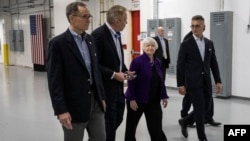ລັດຖະມົນຕີກະຊວງການເງິນ ທ່ານນາງ ຈາເນັຕ ເຢລເລນ ໄດ້ກ່າວໃນວັນພຸດ ວານນີ້ວ່າ ທ່ານນາງບໍ່ຄວນປະຕິເສດຕໍ່ການເອົາບາດກ້າວຕ່າງໆເພີ້ມອີກ ເພື່ອປົກປ້ອງອຸດສາຫະກຳພະລັງງານສະອາດທັງຫຼາຍຂອງສະຫະລັດ ຈາກຄູ່ ແຂ່ງຝ່າຍຈີນ ຂະນະທີ່ທ່ານນາງເດີນທາງໄປຈີນ ເກືອບອາທິດນຶ່ງ ເພື່ອການ ເຈລະຈາລະດັບສູງທີ່ແນໃສ່ເພື່ອຮັກສາຄວາມສຳພັນທາງການເງິນແລະເສດຖະກິດ ລະຫວ່າງສອງປະເທດທີ່ມີເສດຖະກິດໃຫຍ່ທີ່ສຸດໃນໂລກ ໃຫ້ມີສະຖຽນລະ ພາບຕໍ່ໄປ.
ໃນລະຫວ່າງການຢຸດແວ່ຕື່ມນ້ຳມັນຢູ່ໃນລັດອາລາສການັ້ນ ທ່ານນາງເຢລເລນ ໄດ້ກ່າວຕໍ່ບັນດານັກຂ່າວວ່າ ລັດຖະບານທ່ານໄບເດັນຢາກສະໜັບສະໜຸນ ອຸດສາຫະກຳແຜງເກັບແສງຕາເວັນ, ລົດໄຟຟ້າ ແລະ ໝໍ້ໄຟຂອງສະຫະລັດ ທີ່ກຳລັງເຕີບໃຫຍ່ຂະຫຍາຍໂຕ.
ເມື່ອຖືກຖາມວ່າ ທ່ານນາງຈະຍົກຄວາມຄາດຫວັງ ກ່ຽວກັບ ສິ່ງກີດຂວາງທາງການຄ້າໃໝ່ຂຶ້ນມາເວົ້າກັບຄູ່ຮູ່ຈີນຫຼືບໍ່ ທ່ານນາງໄດ້ຕອບວ່າ “ພວກເຮົາ ສະໜອງເງິນອຸດໜຸນໃຫ້ບາງພາກສ່ວນທັງຫຼາຍເຫຼົ່ານີ້ ແລະຂ້າພະເຈົ້າບໍ່ຢາກ ປະຕິເສດຕໍ່ວິທີທາງອື່ນໆທີ່ອາດເປັນໄປໄດ້ ເຊິ່ງພວກເຮົາຈະປົກປ້ອງເຂົາເຈົ້າ.”
ທ່ານນາງບໍ່ໄດ້ລະບຸວ່າເອົາບາດກ້າວໃໝ່ຂອງສະຫະລັດ ອາດລວມມີການ ເກັບພາສີ ຫຼືບໍ່.
ທ່ານນາງເຢລເລນໄດ້ກ່າວກ່ອນການເດີນທາງວ່າ ການໃຫ້ເງິນອຸດໜຸນຂອງຈີນ ຕໍ່ພະລັງງານສະອາດ ແລະອຸດສາຫະກຳທີ່ຜະລິດເກີນຄວາມຕ້ອງການນັ້ນ “ຈະສ້າງຄວາມເສຍຫາຍຕໍ່ບໍລິສັດຕ່າງໆ ແລະພວກຄົນງານຂອງອາເມຣິກາ ພ້ອມທັງບໍລິສັດທັງຫຼາຍແລະພວກຄົນງານຢູ່ທົ່ວໂລກ.”
ການເດີນທາງດັ່ງກ່າວແມ່ນການເດີນທາງໄປ ຈີນ ເປັນຄັ້ງທີສອງຂອງທ່ານນາງ ເຢລເລນ ແລະມີຂຶ້ນນຶ່ງວັນລຸນຫຼັງປະທານາທິບໍດີ ໂຈ ໄບເດັນ ຂອງສະຫະລັດ ແລະຜູ້ນຳຂອງຈີນ ສີ ຈິ້ນຜິງ ໄດ້ໂອ້ລົມກັນທາງໂທລະສັບໃນອາທິດນີ້ເປັນຄັ້ງ ທຳອິດ ນັບຕັ້ງແຕ່ໄດ້ພົບປະກັນໃນເດືອນພະຈິກປີກາຍນີ້. ມັນຍັງເກີດຂຶ້ນຂະ ນະທີ່ມີການກວດສອບປັກກິ່ງຍິ່ງກວ່າເກົ່າກ່ອນການເລືອກຕັ້ງປະທານາທິບໍດີ ຂອງສະຫະລັດ ແລະວໍຊິງຕັນ ພວມຮັດກຸມການລະງັບການຂາຍຜະລິດຕະພັນ ເທັກໂນໂລຈີຂັ້ນສູງໃຫ້ຈີນ.
ລຸນຫຼັງການລົມກັນທາງໂທລະສັບ, ທ່ານສີ ໄດ້ເຕືອນທ່ານ ໄບເດັນ ວ່າ ສະຫະລັດ “ໄດ້ສ້າງຄວາມສ່ຽງທັງຫຼາຍ” ດ້ວຍການປາບປາມການຄ້າຂາຍ ແລະການພັດທະນາເທັກໂນໂລຈີຂອງຈີນ ອີງຕາມອົງການຂ່າວ ຊິນຫົວ ຂອງທາງການຈີນ.
U.S. Treasury Secretary Janet Yellen said Wednesday she would not rule out taking additional steps to protect U.S. clean energy industries from Chinese competition, as she traveled to China for nearly a week of high-level talks aimed at further stabilizing financial and economic ties between the world’s two largest economies.
During a refueling stop in Alaska, Yellen told reporters the Biden administration wants to support the growth of the U.S. solar panel, electric vehicle and battery industries.
"We're providing tax subsidies to some of these sectors, and I wouldn't want to rule out other possible ways in which we would protect them," Yellen said, when asked whether she would raise the prospect of new trade barriers with her Chinese counterparts.
She did not specify whether new U.S. steps could include tariffs.
Yellen said ahead of her trip that China’s subsidizing clean energy and industrial overcapacity “hurts American firms and workers, as well as firms and workers around the world.”
The trip is Yellen’s second to China and comes after U.S. President Joe Biden and Chinese leader Xi Jinping spoke this week in a phone call for the first time since meeting in November. It also comes as scrutiny of Beijing intensifies ahead of the U.S. presidential elections and Washington tightens curbs on the sale of high-tech goods to China.
Following the 105-minute phone call, Xi warned Biden that the U.S. was "creating risks" by suppressing China’s trade and technology development, according to state-run Xinhua news agency.
A senior Treasury Department official who briefed reporters ahead of the trip said that in addition to meetings with China’s economic czar, Vice Premier He Lifeng, and other current and former central government officials, Yellen will also meet with students, professors and business leaders.
Her visit begins with a two-day stop in the southern city of Guangzhou, where Yellen will hold a roundtable discussion with economic experts to discuss the challenges and opportunities of China's economy, and meet with American business leaders and the governor of Guangdong Province, Wang Weizhong.
“Secretary Yellen is interested in listening to a variety of voices in China to better understand current dynamics in the country,” the official said.
In Beijing, Yellen will meet with students and professors at Peking University and some of China’s leading economists. Her meetings with central government officials will include sit-downs with the head of China’s central bank and finance minister.
Yellen will also meet with China’s No. 2 official, Li Qiang, during her visit.
A senior Treasury Department official said the trip aims to build on the intensive diplomacy Yellen has already engaged in to manage the relationship. Since her first visit to China last July, Yellen and Beijing’s He Lifeng have launched economic and financial working groups. The groups discuss issues that both country’s face — such as China’s property crisis or the failures of two major U.S. banks last year — and policy responses.
In recent weeks, the U.S. and European Union have increased their focus on subsidies and the impact of China’s excess capacity of goods and cheap exports.
Gary Clyde Hufbauer, a senior fellow at the Peterson Institute for International Economics and former Treasury official, said he believes the main purpose of Yellen's visit is to speak with Chinese officials about overcapacity. But he doesn't expect China to take any action.
"China might give sympathetic answers, but I don't expect policy changes," he told VOA’s Mandarin service via email.
Last week, Yellen said she does not want to focus on retaliation but will warn China about the impact its national underwriting of energy and other companies is having during her visit.
"I intend to talk to the Chinese when I visit about overcapacity in some of these industries, and make sure that they understand the undesirable impact that this is having — flooding the market with cheap goods — on the United States, but also in many of our closest allies," Yellen said.
Her remarks came during a visit to a solar manufacturing factory in Georgia — one of several key swing states in the upcoming presidential election.
Former U.S. president Donald Trump has said that, if elected, he will impose tariffs on China that could be higher than 60%.
In late February, the U.S. Commerce Department launched a probe into whether Chinese vehicles pose a national security threat due to the data they transmit. U.S. lawmakers are also calling on Biden to hike tariffs on Chinese EVs. The EU is also investigating China’s subsidies of the EV industry.
On Wednesday, the European Commission announced an investigation into the subsidies two Chinese-owned solar panel companies may have received. The two companies are contenders in a public bid for a solar power park in Romania.
Li Ya and VOA’s Mandarin service contributed to this report. Some information came from Reuters and Agence France-Press.






ຟໍຣັມສະແດງຄວາມຄິດເຫັນ